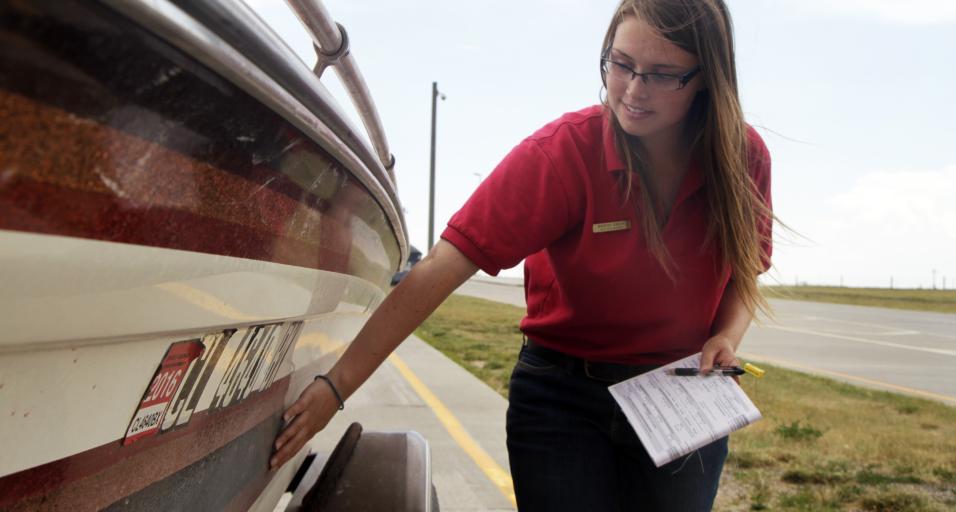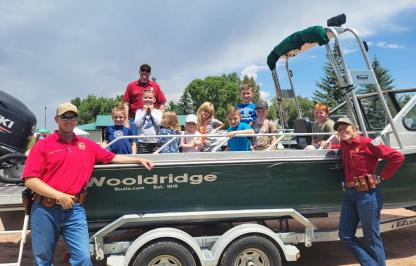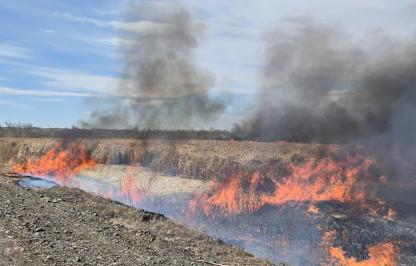Wyoming waters remain free of the invasive and destructive zebra and quagga mussels, and the Wyoming Game and Fish Department is working to keep it that way. Boaters can help stop the spread of mussels, and other Aquatic Invasive Species (AIS) by following Clean, Drain, Dry procedures and getting their watercraft inspected. It helps keep AIS from spreading, and it is the law.
“Boaters help protect Wyoming waters by keeping these invasive mussels and plants out of the state when they stop at check stations and clean the watercraft of mud and plants, drain any standing water, and dry the boat before transport,” said Beth Bear, aquatic invasive species program coordinator.
All boaters are also required to stop for inspection when entering the state and when they come across a check station enroute to their destination. Check stations are at ports of entry, border locations or at boat ramps. Most watercraft users must also display an AIS decal.
“Inspections are easy and fast,” said Bear. “Those few minutes at a check station directly impact the health of the waters we all enjoy by helping to keep them AIS free.”
Boaters have many AIS prevention responsibilities. Boaters should remember that:
- Along with registration of watercraft, watercraft used on Wyoming waters must have an AIS Decal. A Wyoming AIS decal must be displayed on all watercraft (including rentals) using Wyoming waters with the exception of non-motorized inflatable watercraft 10-feet in length or less. While these watercraft are not required to have a decal, they still require an inspection when coming from out of state.
- Boats must stop at established check stations each time a boater passes a check station. Check stations are established at ports of entry, border locations, or at boat ramps and are set-up to ensure watercraft are Clean, Drain, and Dry before launching. Inspections are also available at Game and Fish regional offices during normal business hours.
- Any watercraft transported into Wyoming from March 1 through November 30 must undergo a mandatory inspection by an authorized inspector prior to launching on any Wyoming waterway. If the watercraft was used on a water suspect or positive for invasive mussels in the last 30 days, it must be inspected prior to launching year round.
- If boaters entering Wyoming do not encounter an open AIS check station on their route of travel, it is the boater’s responsibility to seek out an inspection before launching on any Wyoming waterway. Inspection locations may be found on the AIS website.
- A watercraft may launch without further inspection if the watercraft has a properly affixed seal applied by an authorized inspector and is accompanied by a valid seal receipt during transit. The person transporting the watercraft may remove the seal immediately prior to launching on the destination water and must retain the seal and valid seal receipt while on the water.
- Even if a watercraft has been previously inspected and has a valid seal and seal receipt, boaters are still required to stop at any open AIS check station. Having the properly affixed seal and valid seal receipt will expedite the inspection process.
The costs of AIS infestation are great to the sportsperson and the local community, especially when it comes to mussels.
“Invasive zebra and quagga mussels ruin fisheries, ruin boats and clog water delivery systems used for power plants, irrigation and even the pipes in the city, increasing maintenance costs,” said Bear. “Once waters are infested, the mussels cannot be eradicated from large reservoirs, like Flaming Gorge or Alcova.”
For the most recent and up to date information on Wyoming AIS visit the Game and Fish website. The 2018 AIS decal is also available online, at all Game and Fish regional offices, and at license selling agents. A complete list of license selling agents may be found at the department’s website under the Aquatic Invasive Species tab. There is also a combination watercraft registration and AIS Decal that may be purchased for one or three years. Watercraft users may also call the Game and Fish Office for more information at (307) 777-4600.




